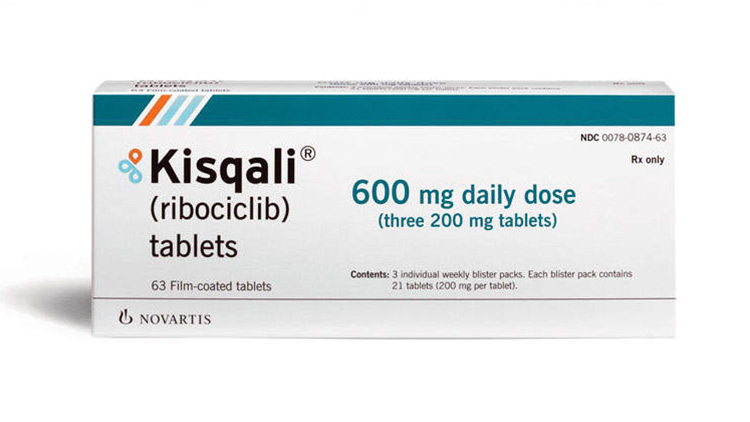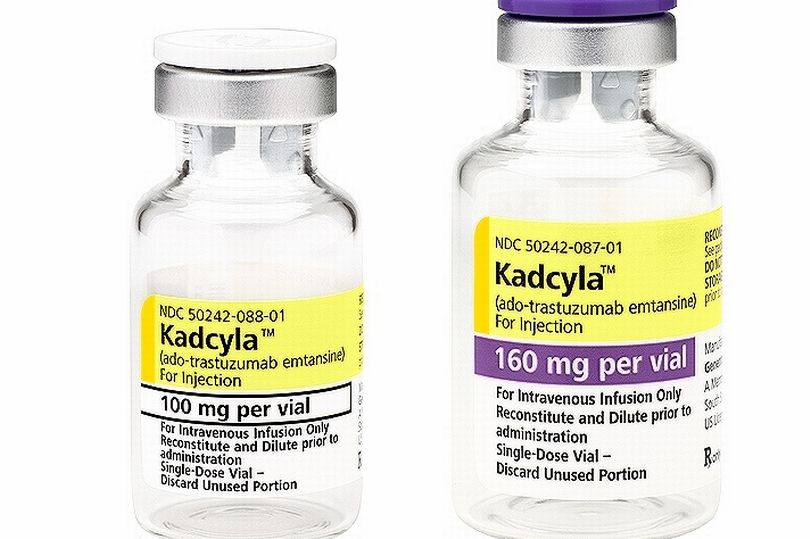Kisqali (ribociclib) vs Kadcyla (trastuzumab emtansine)
Kisqali (ribociclib) vs Kadcyla (trastuzumab emtansine)
Kisqali (ribociclib) is a CDK4/6 inhibitor used primarily in combination with hormone therapy for the treatment of HR-positive, HER2-negative advanced or metastatic breast cancer, particularly in postmenopausal women. Kadcyla (trastuzumab emtansine) is an antibody-drug conjugate that combines trastuzumab, a HER2-targeted therapy, with a chemotherapy agent, and is used for the treatment of HER2-positive breast cancer, often after prior treatments including trastuzumab and taxanes have failed. The choice between Kisqali and Kadcyla would depend on the breast cancer's hormone receptor and HER2 status; Kisqali is chosen for HR-positive, HER2-negative cases, while Kadcyla is used for HER2-positive tumors, making the two drugs suitable for different patient populations.
Difference between Kisqali and Kadcyla
| Metric | Kisqali (ribociclib) | Kadcyla (trastuzumab emtansine) |
|---|---|---|
| Generic name | Ribociclib | Trastuzumab emtansine |
| Indications | Advanced or metastatic breast cancer | HER2-positive breast cancer |
| Mechanism of action | CDK4/6 inhibitor | Antibody-drug conjugate |
| Brand names | Kisqali | Kadcyla |
| Administrative route | Oral | Intravenous |
| Side effects | Neutropenia, nausea, infections, fatigue | Fatigue, nausea, musculoskeletal pain, hemorrhage |
| Contraindications | Hypersensitivity to ribociclib or any of its components | Hypersensitivity to trastuzumab emtansine or any of its components |
| Drug class | Antineoplastic agent | Antineoplastic agent |
| Manufacturer | Novartis Pharmaceuticals Corporation | Genentech, Inc. |
Efficacy
Efficacy of Kisqali (Ribociclib) in Breast Cancer Treatment
Ribociclib, sold under the brand name Kisqali, is a targeted therapy used in the treatment of breast cancer. Specifically, it is indicated for the treatment of hormone receptor-positive (HR+), human epidermal growth factor receptor 2-negative (HER2-) advanced or metastatic breast cancer. It is often used in combination with an aromatase inhibitor or fulvestrant as initial endocrine-based therapy. Clinical trials have demonstrated that Kisqali significantly improves progression-free survival (PFS) when compared to placebo. The MONALEESA-2, MONALEESA-3, and MONALEESA-7 trials have shown that patients treated with Kisqali in combination with endocrine therapy had a prolonged duration of disease control and delayed disease progression.
Efficacy of Kadcyla (Trastuzumab Emtansine) in Breast Cancer Treatment
Kadcyla (trastuzumab emtansine) is an antibody-drug conjugate that combines the HER2-targeting properties of trastuzumab with the chemotherapy agent DM1 (emtansine). It is approved for the treatment of HER2-positive metastatic breast cancer in patients who have previously received trastuzumab and a taxane, separately or in combination. Kadcyla has been shown to improve overall survival and progression-free survival in patients with HER2-positive metastatic breast cancer. The pivotal EMILIA study demonstrated that patients receiving Kadcyla had a significant improvement in median overall survival compared to those who received lapatinib plus capecitabine, another standard treatment for this condition.
Both Kisqali and Kadcyla represent advances in the personalized treatment of breast cancer, targeting specific biological aspects of tumor cells. The use of these drugs is based on the presence of certain receptors and proteins that are involved in the growth and spread of cancer cells. By targeting these pathways, these medications offer an approach to cancer treatment that is tailored to the individual characteristics of each patient's disease, potentially leading to better outcomes and reduced side effects compared to traditional chemotherapy.
It is important to note that while both Kisqali and Kadcyla have shown efficacy in their respective indications, the choice of treatment depends on various factors including the specific characteristics of the breast cancer, previous treatments, and patient health status. Healthcare providers consider these factors when recommending the most appropriate therapy for each patient. Ongoing research and clinical trials continue to refine the understanding of how these drugs can be best used to treat breast cancer.
Regulatory Agency Approvals
Kisqali
-
European Medical Agency (EMA), European Union

-
Food and Drug Administration (FDA), USA

-
Health Canada

-
Therapeutic Goods Administration (TGA), Australia

-
Medsafe (NZ)

Kadcyla
-
European Medical Agency (EMA), European Union

-
Food and Drug Administration (FDA), USA

-
Health Canada

-
Therapeutic Goods Administration (TGA), Australia

-
Medsafe (NZ)

Access Kisqali or Kadcyla today
If Kisqali or Kadcyla are not approved or available in your country (e.g. due to supply issues), you can access them via Everyone.org.
How it works

Make an enquiry
Choose the medicine you want to buy, answer a couple of questions, and upload your prescription to speed things up. We’ll get back to you within 24 hours.


Make an enquiry
Choose the medicine you want to buy, answer a couple of questions, and upload your prescription to speed things up. We’ll get back to you within 24 hours.


Breeze through the paperwork
We'll guide you through the required documents for importing unapproved medicine, ensuring you have all the necessary information.


Get a personalized quote
We’ll prepare a quote for you, including medicine costs and any shipping, administrative, or import fees that may apply.


Receive your medicine
Accept the quote and we’ll handle the rest - sourcing and safely delivering your medicine.

Some text on this page has been automatically generated. Speak to your physician before you start a new treatment or medication.
Let's talk
If you have any questions, call us or send us a message through WhatsApp or email:
Contact us




